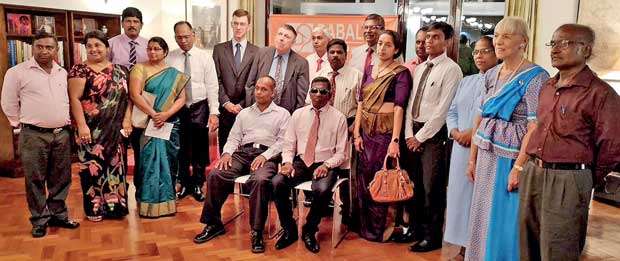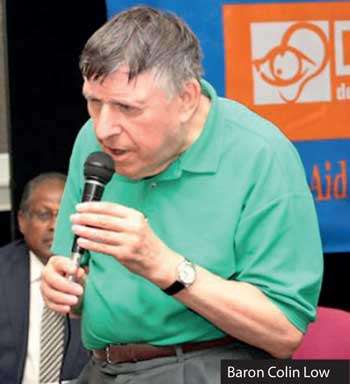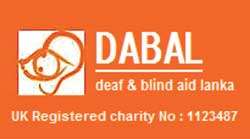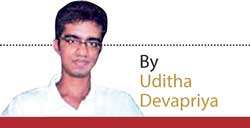Schooling the visually impaired in Sri lanka

DABAL Meeting
When Dr Hudson Silva began his eye donation campaign somewhere in the late 1950s, he “marketed” it as a means of achieving merit in this life, because an earlier campaign to get people to donate corneas had failed. So successful was this marketing tactic that the first batch of corneas he got exceeded by a considerable margin what he had expected. Dr Silva would later be appointed as the President of the International Eye Bank. Today there are monuments, institutions, and roads named after him. Is that enough to venerate him for what he did? I certainly hope so.
The lesson that Dr Hudson taught us was this: those who donate expect something in return. That something may not always be financial, but it has to make the giver “feel good”. In a predominantly Buddhist country, where even non-Buddhists believe in acquiring kusal over akusal and where Buddhist terms are liberally appropriated and disseminated by the Christian clergy, it has become the norm to view those who are less abled as being worthy of pity. Sadly, however, that is not enough.
 Looking through reports, statistics, and interviews of various officials and experts in the field, I believe that we as Sri Lankans are not doing enough to help those who are in need of help. In particular, the blind and the deaf.
Looking through reports, statistics, and interviews of various officials and experts in the field, I believe that we as Sri Lankans are not doing enough to help those who are in need of help. In particular, the blind and the deaf. Consider the plight of the blind. Around 1.7% of Sri Lankans are blind. That works out to about 364,000 people. The most common reason for this is cataract blindness, followed by diabetes and glaucoma. Among the biggest constraints that stand in the way of preventing blindness are inadequate human resources, information systems, and supplies of spectacles. Add to that the glaring problem of inter-regional disparities (13 government eye surgeons in Colombo, as opposed to one in Anuradhapura) and you see the gravity of this issue: when it comes to the blind, there’s no one to lead them. Especially with regard to blind children.
Blind education in this country goes back to 1912 with the founding of the Ceylon School for the Deaf and Blind. Today, it is a registered charity with three institutions (two in Ratmalana and one in Jaffna), which provides education free of charge to a population of over 600 students. Though it receives a stipend from the government, it is not publicly owned or subsidised. Because of this, it faces financial constraints in the provision of facilities and has to raise Rs. 50 million annually on its own.
The “bursary” that children in these and other blind schools receive is around Rs. 50 a day. What can anyone do with that amount of money? To give a comparable figure, a blind school student in the UK would get around £1,000 per annum, which works out to around £2.73 (or Rs. 817) per day. What with financial constraints and bottlenecks it probably is difficult to raise the bursary to such a level here. But then, if we aren’t concentrating on these disadvantaged youngsters, who will be?
We are a nation of givers, we are told. Doesn’t mean we can’t give more. In that sense there are individuals, groups, organisations, and foundations that have done and are doing more, much more, than the government will. Among those foundations, many are run as exercises in Corporate Social Responsibility. Such foundations do a great deal, but since they depend on corporate profitability they can’t be said to have done enough. There are other foundations, though. Among them, DABAL.
DABAL stands for Deaf and Blind Aid Lanka. Established in 2004, it resorts to new and innovative ways of getting donations that go beyond just corporate funding. It has so far been able to support 16 blind schools in the country, a lot considering the severe financial constraints it has had to put up with at a time of austerity in Britain. DABAL, however, does not as yet have a branch in Sri Lanka, though it has targeted that most marginalised kind of educational institutions, the rural school. It’s “small” in the sense that corporate social responsibility projects are “big”, but the way I see it, it has done more, much more than what those projects can ever achieve.
Consider the plight of the blind. Around 1.7% of Sri Lankans are blind. That works out to about 364,000 people
 Deaf and Blind Aid Lanka has a patron. Not just a patron, but a guiding figure. I met him three months ago. His name, Colin Low. Baron Low of Dalston.
Deaf and Blind Aid Lanka has a patron. Not just a patron, but a guiding figure. I met him three months ago. His name, Colin Low. Baron Low of Dalston. Colin Low currently sits in as an MP in the House of Commons. When he entered the House in 2004 (the same year DABAL was founded), he was considered as the first blind person to sit there, though as he pointed out, “that honour is not quite singular.” Born in 1942 (“halfway through the War”) in Edinburgh, he was left fatherless at the age of two and had to struggle hard to obtain a proper education. Initially educated in Scotland, he left for Oxford in 1961 and to Cambridge in 1965, becoming a lecturer in Law at Leeds University. Over his tenure (1968-1984), he would see Harold Wilson, Edward Heath, James Callaghan, and Margaret Thatcher; the campaign for disability rights would begin with Wilson and culminate with Thatcher’s successor, John Major, when in 1995 the Parliament passed the Disability Discrimination Act.
Baron Low was at the forefront of disability rights in these heady years and decades. He was particularly concerned with rights for blind students, at a time when the notion of disability rights was limited to the Welfare State (“which was hardly enough”). The National Federation for the Blind, the Association for the Blind and Partially Blind, and the National Bureau for Handicapped Students were some of the organisations he was involved with. Tony Blair’s government, which succeeded John Major’s, finally recognised all these efforts when it gave “stronger teeth” to the 1995 Act through the Disability Rights Commission of 1999. In the meantime, Low would become Chairman of the Royal National Institute for the Blind in 2000. Six years later, he was approached by DABAL to be its patron. Which he became in 2007, and which he still is today.
DABAL has visited Sri Lanka frequently, but Baron Low was able to visit it only this year. When I met him a day or two before his departure, he told me that the interest shown by teachers and staff members at the blind schools he had visited (five in total, including the Ratmalana School and also schools in Kandy, Kandalama, Galle, and Matara) was incongruent with the funding that they desperately needed. At one level, it had to do with the attitude of the government towards their maintenance: “These are schools that are in part at least patronised by the State, but to what extent? It seems to me that the State takes responsibility for them only as far as appointment of teachers and principals is concerned. Beyond that, it doesn’t appear to be bothered.”
There’s another problem. Since 2010, it has become a norm for parents to send blind students to normal schools. These include public as well as private schools. But is the quality of education given to them enough? Baron Low told us that doesn’t seem to be the case, “because what happens more often than not is that disabled children, who are blind, deaf, dyslexic, or ‘mentally retarded’ as some like to term it, are holed up in one classroom with indifferent teachers who frankly don’t know how to respond to each in kind.” As an example, he pointed out the case of a school which refused the services of a sign language interpreter that a student had badly wanted.
This, of course, is in keeping with how our culture likes to pile the differently-abled in one basket, treating them not as different, but as separate. It’s discrimination tinged with pity and condescension, an attitude hardly endemic to our culture but certainly symptomatic of a society which marginalises the different on the basis that they probably committed a sin in his or her past life.
We are a nation of givers, we are told. Doesn’t mean we can’t give more
Baron Low, as he himself told me, enjoyed Sri Lanka. “I’ve visited the subcontinent several times, but never here.” He would have “felt” the usual images associated with this country: the coconut trees, the tropical climate, the sun-baked coastlines, and of course the candid ever smiling people. Such optimism, however, barely if at all masks the glaring shortcomings of our education system for the differently-abled. The truth is that the system, like the schools in it, is (as he put it) in “a basic state of repair.”
He could have said that of many other things in the country. But for the purpose of this article and timely issue, it sums up the reality quite well. The major role for the amelioration of these problems, he put it before wrapping up our interview, “must come from the State.” Private charity will thus never be enough, “because they are determined by the whims of individuals, not the needs of society.”
Will our government respond to DABAL and Baron Low? Will it take stock of what’s ailing the system and go beyond philanthropy? That, of course, remains to be seen.
UDAKDEV1@GMAIL.COM

